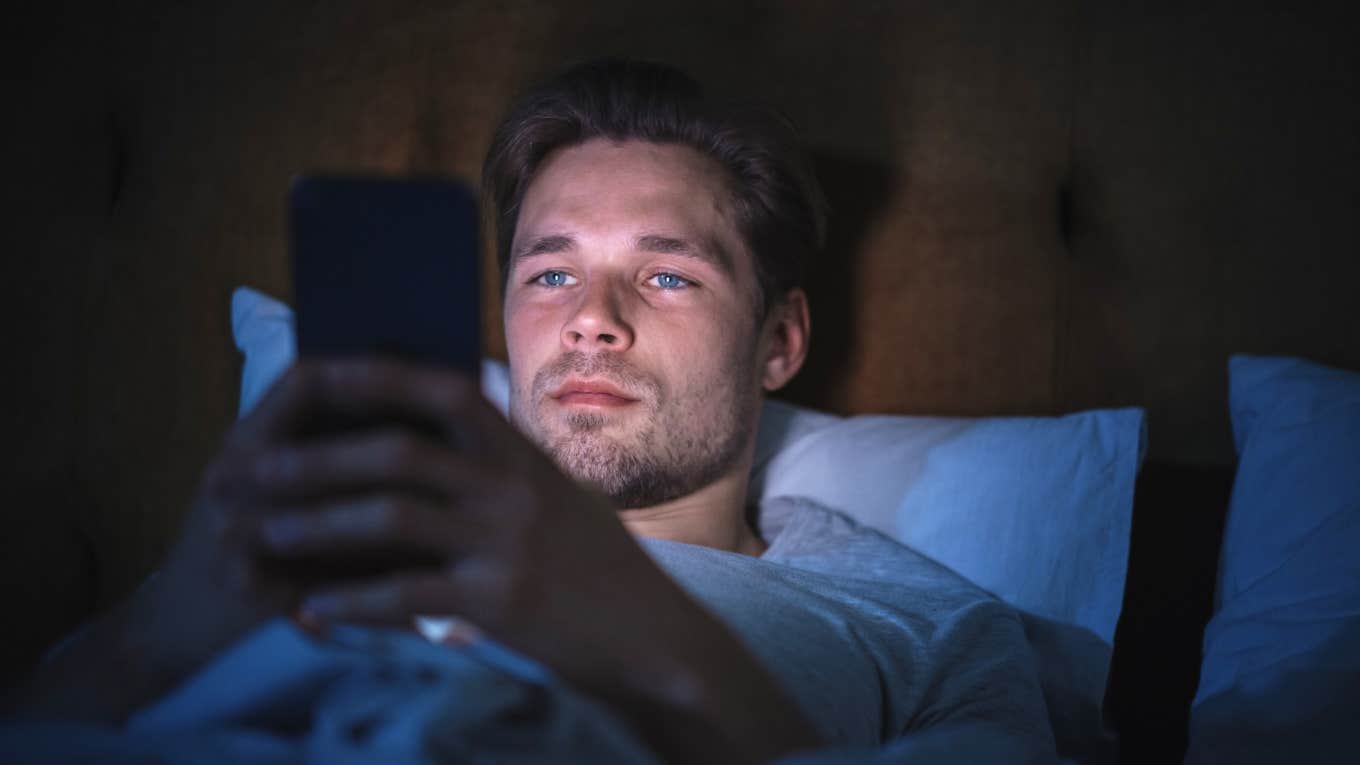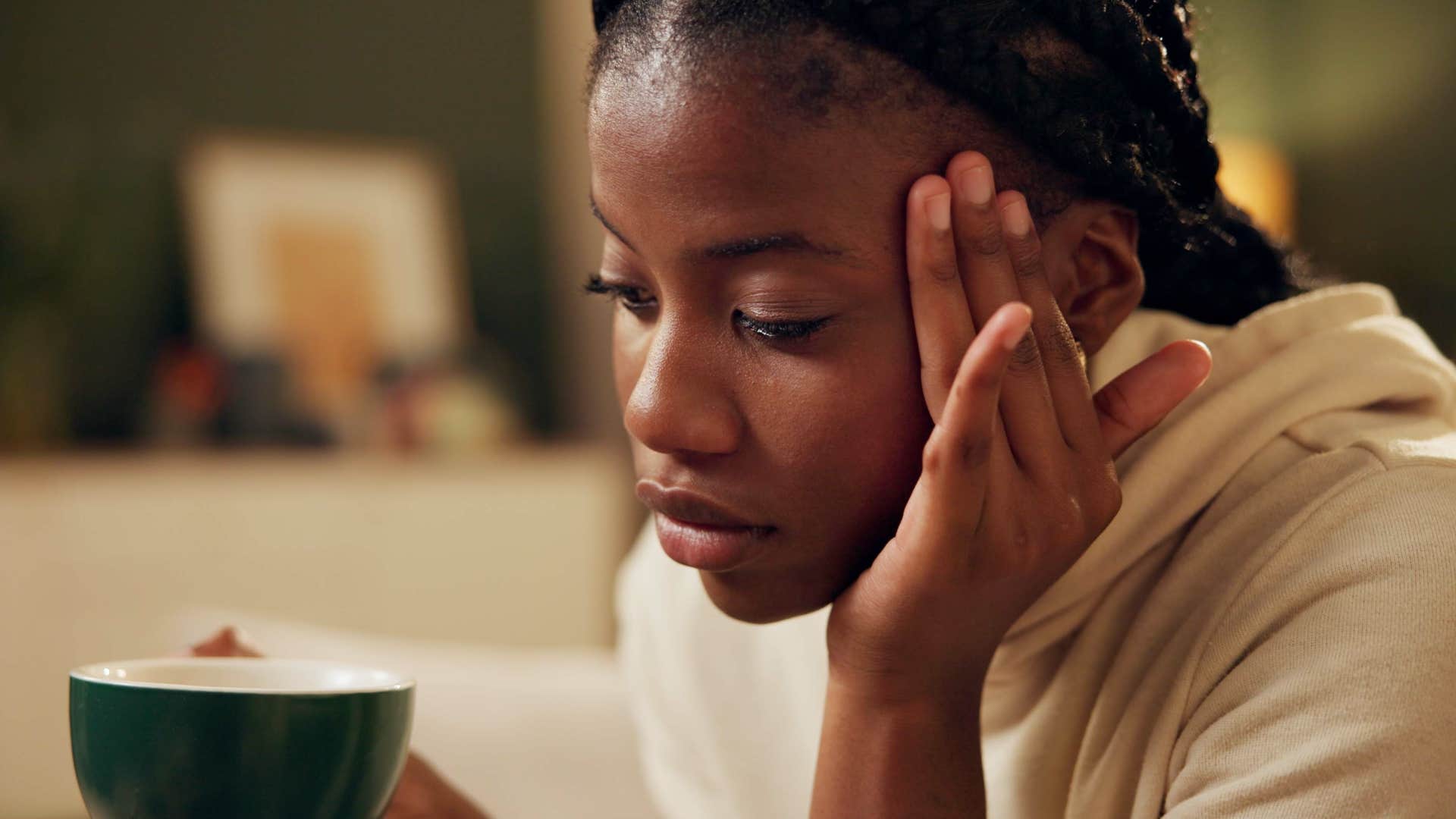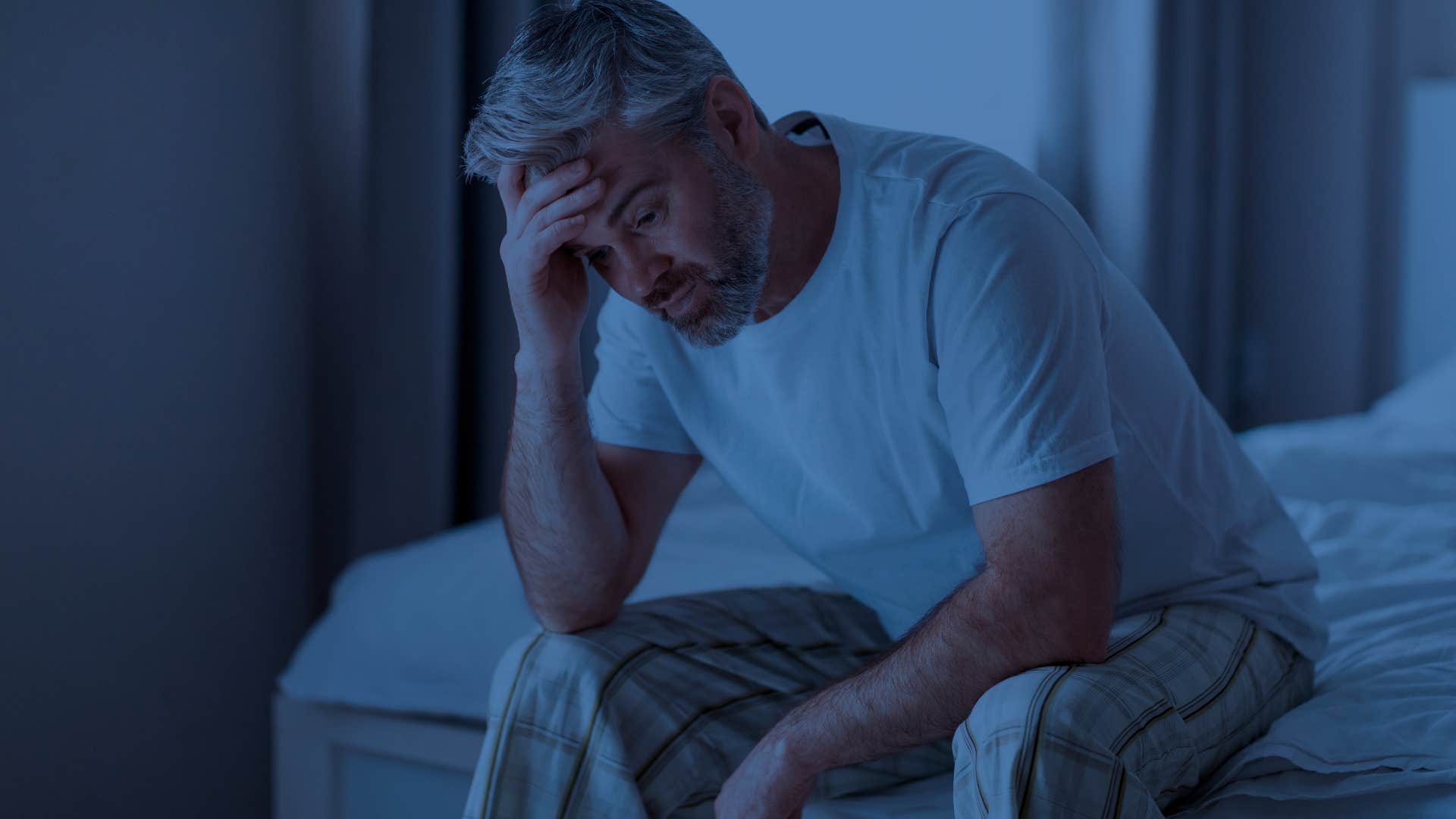People Who Usually Scroll On Their Phone Before Falling Asleep Usually Have These 11 Issues
A new healthy nighttime routine could truly change your life.
 Gorodenkoff | Shutterstock
Gorodenkoff | Shutterstock There are a number of consequences from too much screen time or social media usage during the day, but a study from Frontiers in Psychiatry found that nighttime phone usage also has profound impacts on personal health and well-being. Not only is the body's natural sleep-wake cycle disrupted by a late night "doomscroll" or endless social media time before bed, a person's ability to fall asleep and stay asleep is drastically reduced.
There are plenty of issues people who usually scroll on their phone before falling asleep usually have, but it's not just bedtime rituals and quality sleep that's affected by this behavior; rather, it's a sleuth of other social, personal, and professional consequences during the day as well. By recognizing some of these subtle experiences you may be struggling with, you not only have the opportunity to craft a more restful nighttime routine, but also a better waking experience and reality.
Here are 11 issues people who usually scroll on their phone before falling asleep usually have
1. Insomnia
 Lysenko Andrii | Shutterstock.com
Lysenko Andrii | Shutterstock.com
According to a PLOS One study, mobile phone usage before bed can drastically affect sleep quality — promoting insomnia, fatigue, and cognitive decline in people who don't set limits around their screen time at night. From affecting memory, to productivity during the day, and quality sleep throughout the night, having your phone in bed with you can have severe consequences on happiness, well-being, and health.
Sometimes, a change in routine doesn't have to be dramatic. Keep a book on your nightstand for entertainment before bed. Plug in your phone with its alarm out of reach from your covers. Find other hobbies and calming activities to engage in after the sun sets.
It's uncomfortable at first, but the difference you'll experience in your sleep routine and general energy during the day will be profoundly worth it in the long run.
2. Waking up tired
 PeopleImages.com - Yuri A | Shutterstock.com
PeopleImages.com - Yuri A | Shutterstock.com
People who tend to scroll on their phones before falling asleep generally wake up feeling tired — overloading their brain with thoughts, anxiety, and stimulation when their brain is yearning for rest and relaxation at the end of the day.
Especially if you're starting your day with your phone — disrupting the natural flow of thoughts, wakefulness, and regulation that happens first thing in the morning — you're more likely to disrupt natural energy levels and battle more fatigue before you even get out of bed. A cycle of constant phone usage and screen time can be a hard routine to break, but still incredibly important and essential for well-being with new healthy rituals.
3. Constant anxiety
 PeopleImages.com - Yuri A | Shutterstock.com
PeopleImages.com - Yuri A | Shutterstock.com
According to a report shared by the CDC, more than four hours of screen time a day is associated with higher levels of anxiety and overwhelm, especially when scrolling and phone usage happens first thing in the morning or right before falling asleep.
When your brain doesn't have a chance to truly unpack the day's events, regulate emotions, and clear out overwhelming thoughts at the end of the day, that anxiety can linger for much longer than necessary.
So, if you're always battling anxiety and struggling with focus amid overthinking tendencies, try limiting screen time before bed and opting for more mindful activities like reading, stretching, or simply laying with your thoughts.
4. Daily fatigue
 afotostock | Shutterstock.com
afotostock | Shutterstock.com
Poor sleep quality and unhealthy nighttime routines are some of the most prominent causes of daytime fatigue, according to a 2021 study. When people are using the last moments of the day to scroll on social media, respond to work emails, or play games behind their bright phone screen, they're sabotaging opportunities for truly restful quality sleep.
If you're feeling fatigued during the day — struggling to concentrate, focus on work, or confidently tackle your daily responsibilities — chances are it's not just a sign of burnout or an overloaded work schedule, but a lack of healthy habits at the end of the day.
If you don't have reflective hobbies or self-care time to truly unpack stress from the day, you'll continue to carry it over day-after-day, sabotaging sleep, productivity, and general well-being.
5. Painful headaches
 PeopleImages.com - Yuri A | Shutterstock.com
PeopleImages.com - Yuri A | Shutterstock.com
Lacking sleep and poor sleep quality can spark more physical symptoms during the day like headaches, immune system problems, and general aches and pains, as well as more emotional experiences like nagging anxiety.
While headaches and other subtle physical ailments can feel difficult to overcome and understand, especially for people battling heavy workloads, tons of responsibilities, and a number of other mental concerns, starting with fixing sleep routines and prioritizing rituals that allow for better quality sleep can help to inadvertently solve many of those qualms on a daily basis.
6. Brain fog
 Golubovy | Shutterstock.com
Golubovy | Shutterstock.com
According to experts from Healthline, struggling with concentration, focus, and brain fog are some of the most common symptoms of not getting enough sleep. When you're scrolling on your phone before bed and overloading your brain with stimulation from a phone screen, social media, or even work responsibilities from your bed, trying to make it a restful space for sleep becomes much more difficult and complicated.
One in three adults in the United States aren't getting enough sleep on a regular basis, oftentimes due to chronic stress and unhealthy habits like scrolling on their phones before going to bed. Amid a chaotic schedule and balancing a million different responsibilities, making time for sleep and a healthy nighttime routine can feel like a waste of time, but in the long run, everything benefits — from productivity to emotional well-being — and pays off.
7. Dependency on their phone
 PeopleImages.com - Yuri A | Shutterstock.com
PeopleImages.com - Yuri A | Shutterstock.com
Many people, specifically young people who have spent their entire lives in a digital landscape, struggle with phone dependency that negatively impacts every aspect of their lives, from mental health to sleep quality. When you refuse or struggle to set boundaries around phone usage, it's much harder to look out for your general health, especially if you haven't reaped the benefits of those boundaries and space from your phone before.
Whether it's doomscrolling on social media or just responding to messages from bed, when you feel dependent on your phone, it's much easier to sacrifice well-being, healthy habits, and healthier hobbies for the sake of comfort online.
8. Weakened immune system
 amenic181 | Shutterstock.com
amenic181 | Shutterstock.com
According to experts from Yale Medicine, there's a strong association between sleep quality and immune processes. When you're sick, and your body is fighting off an illness, your sleep tends to struggle. On the other side of things, when you're not getting enough sleep, your immune system suffers, unable to keep up with the consequences of sleep deprivation alongside its normal processes fighting off pathogens and illness.
When you're spending your evenings completely on your phone, you're sabotaging sleep, of course, but you're also sabotaging other holistic bodily processes that can affect your health and well-being.
9. Frequent nightmares
 Prostock-studio | Shutterstock.com
Prostock-studio | Shutterstock.com
According to a study on adolescent nightmares, people who keep their phone with them in bed or scroll before sleeping tend to experience poorer sleep and more nightmares than those who don't.
It's not just about sleep disturbances — like keeping your ringer on at night — it's also the subconscious elements of having your phone nearby. If you're busy at work or overstepping work-life boundaries, having communication on your phone nearby can spark anxiety and overthinking tendencies that also sabotage quality sleep and promote more nightmares that disturb quality routines.
10. Reduced productivity
 Fizkes | Shutterstock.com
Fizkes | Shutterstock.com
Not getting quality sleep can sabotage productivity, energy levels, creativity, and well-being during the day, which can spiral into a cycle of emotional turmoil that's hard to break free from without cultivating better habits and routines.
If you're using your phone before bed, it might not be directly obvious that lacking job satisfaction or poor productivity is in relationship to this behavior. However, recognizing that sleep is fundamental to well-being — from your personal life to the workplace — can ensure it's remaining a top priority.
11. Strained relationships
 PeopleImages.com - Yuri A | Shutterstock.com
PeopleImages.com - Yuri A | Shutterstock.com
When you're not getting enough sleep or struggling with a nighttime routine, it's not just personal emotional struggles that manifest, but a number of other social and interpersonal experiences.
When you're not getting enough sleep, you're not showing up as your best self. From feeling distracted in conversations with close friends, to falling behind on projects at work, and even struggling to emotionally regulate during conflicts in your personal life, not getting enough sleep can be detrimental.
While it may seem simple, people who scroll on their phones before falling asleep have the power to transform many different aspects of their lives by setting boundaries around phone usage.
Zayda Slabbekoorn is a staff writer with a bachelor's degree in social relations & policy and gender studies who focuses on psychology, relationships, self-help, and human interest stories.

